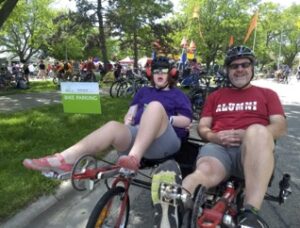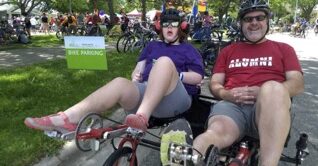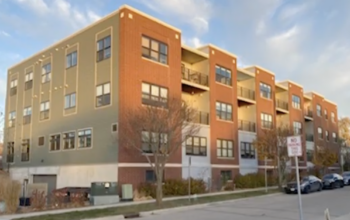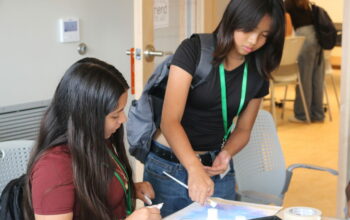Laura Sollinger’s legs burned with every push of the pedal as she climbed the steep hill on her red bike. Her breath came in ragged gasps, each sharper than the crisp morning air, but she pressed on.
Between each inhale and exhale, she belted her spirited rendition of “Old MacDonald Had a Farm.” Beside her in the passenger seat, her daughter, Rosie, thirteen at the time, happily sang along.
“Rosie is almost a different person on the bike,” said Brian McNurlen, Sollinger’s husband. “We’d play her favorite songs, but she sings really loudly. So when people are just walking on the sidewalk, they're like, ‘What the heck is coming towards me?’ And then they'd see her, and everybody would smile.”
Over the past few years, these tandem rides with Rosie and Sollinger’s trusted Bluetooth speaker have become a cherished daily routine. After trying numerous bikes that might allow Rosie to see the world, McNurlen and Sollinger finally found a solution.
During the pandemic,Tim Staton, owner of The Cargo Bike Shop, a local bicycle store on Williamson Street, loaned the family a two-seat trike; the bike worked so well that, in 2021, they purchased the same type of trike from Cargo.
Rosie, now 17, enjoys listening to songs like “Three Little Birds” by Bob Marley and “Single Ladies” by Beyoncé during rides with her mother or her father. But even though Rosie’s musical tastes have changed, one element remains the same: The family’s positive feelings associated with biking in Madison.
McNurlen and Sollinger represent two of the many bikers in Madison. While other Big Ten cities such as Ann Arbor, Michigan; Bloomington, Indiana; and State College, Pennsylvania are well-known for their cycling cultures, Madison’s biking landscape consistently ranks higher.
In 2024, Madison scored a People for Bikes city rating of 58, a notable increase from its 50-point rating in 2020. Each city’s score stems from its safe speeds, protected bike lanes, intersection treatments, network connections and reallocated space for bikes.
The average score in 2024 for all U.S. cities was 28.
According to Ben Varick, a biking infrastructure advocate and the Dane County high school education manager for Wisconsin Bike Fed, the city deserves its well above average ranking. In fact, Madison currently contains over 200 miles of bike paths, trails and lanes, making it easier for residents such as Sollinger and McNurlen to choose biking over driving.
The combination “really opens up the whole city as accessible,” Varick said. “That access to opportunities improves people’s quality of life and makes a city more livable and makes a community stronger.”
Sollinger and McNurlen enjoy biking for the environmental, physical and overall mental benefits biking brings their family. Their wide, Dutch-made red trike bike allows two family members to pedal side-by-side, turning everyday rides after meals into shared family adventures.
Sollinger and McNurlen’s older son, Sam, would also occasionally join his parents on their traditional tandem for a softer — but equally powerful — ride.
“Sam is very quiet and lives in his head,” McNurlen said. “When we would get on that bike, we would talk about philosophy. It’s almost like when his muscles were engaged, it allowed his brain to work in a different way.”
Pedaling Change for Children
In 2021, inspired by his family’s shared love of cycling, McNurlen launched Madison Adaptive Cycling, a nonprofit that helps people with physical disabilities and cognitive impairments find bikes that work well for them. The nonprofit stores adaptive cycles with Bikes for Kids Wisconsin, another community organization that provides bikes to people who otherwise couldn’t afford them. According to Kristie GoForth, executive director of Bikes for Kids Wisconsin, the nonprofit has given away 12,609 bikes to members of the Madison community since its establishment in 2017, focusing on first-generation bicycle owners.
While bikes can be costly, GoForth said, they are “vehicles of economic mobility, and they open the doors to opportunities for people.”
GoForth has made it her mission to ensure that all children in Madison have access to bicycles, as biking provides exercise and is often the primary method of transportation for many families in Madison.
“I think of all the kids that ride to community centers in the summer. If they didn’t ride a bicycle, they would not be able to access those places,” GoForth said. “I often joke, you can’t ride your football to work, you can’t ride your football to school. It’s way more than a sport, and it can become a lifestyle as you get older.”
Since some children who receive bikes may not know how to ride them at first, GoForth provides riding lessons to children who need them.
“I can get a five-year-old going in five to ten minutes,” GoForth said. “I have a formula.”
GoForth’s task is simple: eliminate the rider’s fear of falling. Her formula begins with lowering the seat of the bicycle so the child can place their feet firmly on the ground. This adjustment allows the child to practice putting their feet up on the pedals over and over, gradually gaining confidence.
As the child begins pedaling, GoForth grasps the back of the seat, then the child’s shirt. When she finally lets go entirely, the magic happens — she watches the child’s confidence grow with each pedal on their own.
“I truly believe that bicycles can save the world,” GoForth said. “They can save our kids.”
Riding the Road to Recovery
GoForth’s belief in bicycles’ transformative power isn’t just theoretical — it’s echoed by the countless individuals who’ve found a fresh start on two wheels, such as Ryan Roghers, a 50-year-old area resident who turned to cycling after a period of declining health.
After undergoing major spinal surgeries, Roghers became addicted to opioid painkillers in the mid-aughts, he said. Once doctors became aware of the opioid epidemic and cut back on prescribing the drugs, he turned to alcohol for relief, but drinking more caused him to gain weight at a rapid rate.
“I was constantly in pain, more so than just my health issues,” Roghers said. “My weight was causing additional pain‚ discomfort, mental anguish and things of that nature.”
After his father died of heart failure in 2018, Roghers said he began to reflect on his own health and the importance of getting regular cardiovascular exercise, something his father, while active, had never done consistently.
In May 2021, he quit drinking, which in turn helped him begin to lose weight. Then he saw a friend's social media post about going on a 50-mile bike ride in Arizona.
Biking had always been one of those things that “piqued my curiosity,” Roghers said, but seeing the post gave him “the nugget” of an idea. “I thought, ‘Wow, 50 miles. I wonder if that’s something I can do.’ I had an idea that if I got down to 250 pounds, I would start cycling.”
When Roghers hit his weight goal in 2022, he grabbed his old hybrid bike and never looked back. He said he encourages others to do the same.
“I would start small and take it one day at a time — kind of the same with everything else in life,” Roghers said. “Small, incremental changes in life are generally what is needed.”
Three years and a loss of over 165 pounds later, Roghers said biking is a part of his daily routine, and he has ridden over 13,000 miles since he got serious about biking in 2022.
“Maybe I do have somewhat of an addictive personality,” Roghers said, but now he’s focused on doing something “every single day towards better health” and promoting cycling awareness and equity.
“When I started cycling, I found a newfound passion, and this passion gave me a purpose. I want cycling to be available and inclusive for everybody,” Roghers said. “It’s something that should be available for everybody. I would love for more people to understand how beneficial biking is, not only for their own health, but for the environment, for the community — just for everything.”

Correction: An earlier version of this article misstated the name of a cyclist. She is Laura Sollinger, not Laura McNurlen. It misstated the ages of Sollinger’s children; her son, Sam, is older, not younger, than her daughter, Rosie. It misstated the name of the owner of Cargo Bike Shop. He is Tim Staton, not Statton. It also identified Staton as the bike shop’s former owner; he is the shop’s current owner. It stated that the shop had closed its doors during the pandemic, but the closure was temporary, not permanent. It misstated the name of the Dane County high school education manager for Wisconsin Bike Fed; he is Ben Varick, not Vurick. It misidentified the name of the nonprofit run by Kristie GoForth; it is Bikes for Kids Wisconsin, not Bike for Madison. It misidentified Brian McNurlen and his family as weekly volunteers with Bikes for Kids Wisconsin. McNurlen stores adaptive cycles for the nonprofit he founded, Madison Adaptive Cycling, with Bikes for Kids Wisconsin.





